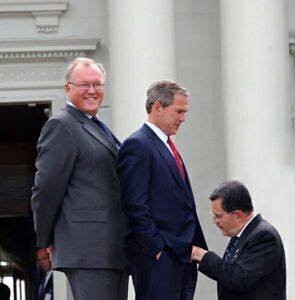(cross-posted at the paper tiger)…
No, I’m not referring to the Bush Administration’s fall-back strategy for coping with the indictment of Scooter Libby and all the suddenly pointing fingers at the lies and deceptions underlying the hollow rationale for the invasion of Iraq. Lots of other blogs out there doing a brilliant job of that (and might I recommend Booman Tribune and firedoglake as places to go for your latest installments of “Scooter Goes to Jail”? Part Two: “Turdblossom’s Fitzmas Present”).
I’m referring to last year’s indy film by first-time director Alice Wu. Now, I work in the film industry and am well-aware of the dynamics that control what films get made and why – one of the reasons that I’d rather read and write novels, to be honest. But occasionally, exceptions come along, and in the case of this one, I can only shake my head in admiration and wonderment.
“Saving Face” is, first, a film about Chinese Americans. With no white people. Well, that’s a big no-no. Second, it’s a film about Chinese American lesbians, which, even given the popularity of girl on girl sex in certain lad-ish circles is still a bit of a commercial stretch. Third, half the film is in Mandarin! Lovely, proper Mandarin, in the case of Joan Chen, always a boon to us aspiring Chinese students. But you gotta figure that market is also somewhat limited. And did I mention the part where this was the director’s first script and first film? That Wu’s previous job was as a software geek at Microsoft? That she quit her job and gave herself five years to get her film made? And along the way, encountered attitudes like these?
”They had me meet with a lot of people in Hollywood, mostly Asian-American studio executives, which I hadn’t honestly known existed,” Ms. Wu said. She also hadn’t anticipated just how often she would be asked to consider changes that struck at the very heart of the script everyone seemed to like so much: Couldn’t Ms. Wu make her characters white, so maybe the young doctor could be played by, say, Reese Witherspoon, and Ellen Burstyn could be cast as her mother? How about making the love affair heterosexual? Did she have to direct as well as write it? It was advice Ms. Wu declined to take.
(from an unlinkable May 29, 2005 NYT article)
The only part of this I have any sympathy for is the caution about giving a complete novice director the helm. God knows there have been far too many inexperienced directors who’ve cost studios tons of money because they don’t have a clue what they’re doing. That applies to some pretty well-known directors as well (*cough* let’s just say he’s not “money” *cough*).
Anyway, “Saving Face” is a charming dramatic comedy that’s been compared to “My Big Fat Greek Wedding” and “Bend It Like Beckham.” I haven’t seen the latter film but can say that it’s a much better movie than the first, even with what I feel is one dramatic misstep (which since I don’t want to drop a spoiler, I’ll decline to go into here). The film is about a young doctor in NYC who does not know how tell her very traditional family that she’s gay (and in love with a ballerina, no less). Add to that her widowed mother’s mysterious pregnancy (she declines to identify the father). Kicked out of her Flushing-based parents’ house, Mom moves in with daughter, redecorates the apartment in proper Chinese fashion and holes up watching bad Chinese soap operas (are there any other kind?). Will mother and daughter remain enslaved to tradition and misery? Or will they risk opening themselves up to real love?
Now available on DVD. I urge you all to rent and watch, if for no other reason than to support a tenacious filmmaker who stayed true to her vision and somehow got it done, and in fine style. But I think you’ll enjoy the film too.


Comments